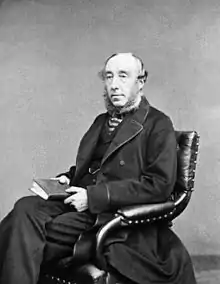Thomas Blizard Curling
Thomas Blizard Curling (1811 – 4 March 1888) was a British surgeon.

He was born in Tavistock Place, London in 1811, the son of civil servant Daniel and Elizabeth (née Blizard) Curling and educated at Manor House, Chiswick. Without a degree but through the influence of his surgeon great uncle, Sir William Blizard, he became assistant-surgeon to the Royal London Hospital in 1833, becoming full surgeon in 1849. In 1834 he won the Jacksonian prize for his investigations on tetanus; and he became famous for his skill in treating diseases of the testes and rectum, his published works on which went through many editions.[1] A stress ulcer resulting from burns is called a Curling's ulcer after him.[2]
He was elected a Fellow of the Royal Society in June 1850.[3] After filling other important posts in the College of Surgeons, he was appointed president of the College in 1873.[1]
He died in Cannes, France on 4 March 1888.
References
-
 One or more of the preceding sentences incorporates text from a publication now in the public domain: Chisholm, Hugh, ed. (1911). "Curling, Thomas Blizard". Encyclopædia Britannica. 7 (11th ed.). Cambridge University Press. p. 645.
One or more of the preceding sentences incorporates text from a publication now in the public domain: Chisholm, Hugh, ed. (1911). "Curling, Thomas Blizard". Encyclopædia Britannica. 7 (11th ed.). Cambridge University Press. p. 645. - "THOMAS BLIZARD CURLING (1811-1888) CURLING'S ULCER OF THE DUODENUM". NewOrleans: JAMA. Retrieved 1 October 2014.
- "Lists of Royal Society Fellows 1660-2007". London: The Royal Society. Archived from the original on 24 March 2010. Retrieved 21 August 2010.